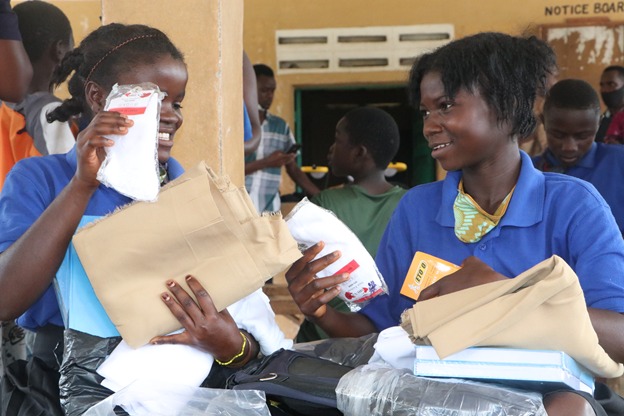279 children all set to start secondary school

Girls in Massam comparing school materials they have just received to support their transition to secondary school, September 2020. Photo credit: Abdul Sillah, Save the Children
Last week Save the Children completed distribution of junior secondary school materials to 279 children in Pujehun district. This figure brings the total number of beneficiaries to over 500 in four years. Materials include, shoes, uniforms, bags, and learning materials.
The package signifies successful completion of primary school following the National Primary School Examination (NPSE) under the three-year Accelerated Education Program.
Among pupils that will be moving on to secondary school, are children from the most vulnerable families from six chiefdoms in Pujehun district; Massam, Potoru, Zimmi, Gondapi, Jendema and Bumpeh . They include those who have had no formal education, and those that dropped out of school as child mothers or because of child marriage.
“These villages mainly depend on subsistent farming or fishing so most parents cannot afford to send their children to secondary school.” said Charles Vandi, a community leader from Gbondapi.
“If not for this program, most of these children will end like their parents - doing farming or fishing just to survive. Girls are even worse. Our only expectation for them here is early marriage or teenage pregnancy. This program has given them the opportunity to improve their lives and a chance to pursue something completely different.”
For Yatta Manjagbe, a 12-year-old orphan living with her grandmother, the provision of these materials has brought relief to her grandmother who cannot afford to cover the costs of these items as well as save money for her lunch when she starts secondary school in October. “I am really happy for this package. I live with my grandmother who is an old farmer. She cannot afford all these things Save the Children has given me. This makes me look forward to going back to school.”
AEP started in March 2016. It aims to support out-of-school children and over-age children (12-18 years old) to complete primary school in three years instead of six, based on the belief that older children have the capacity to learn faster.
 Sierra Leone
Sierra Leone